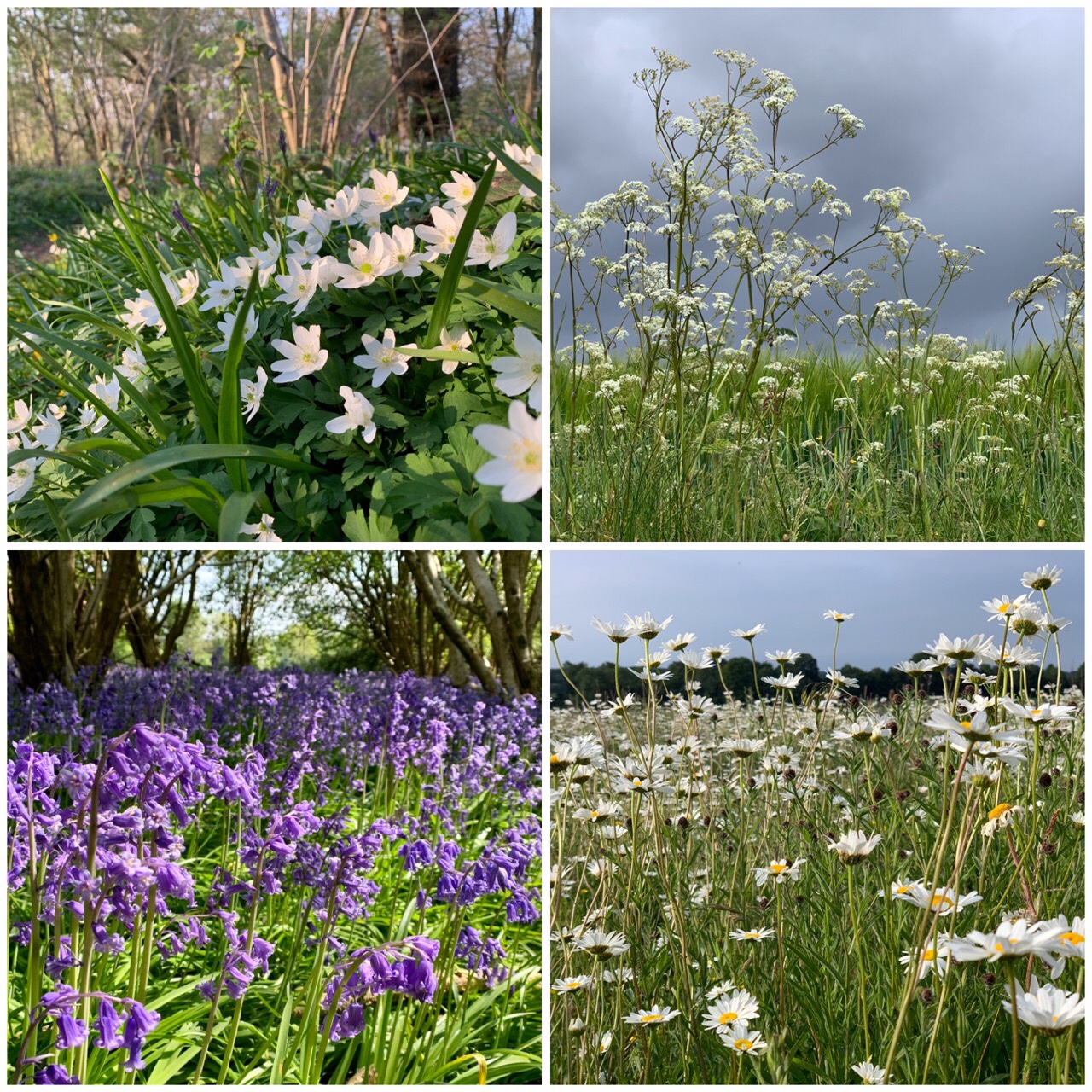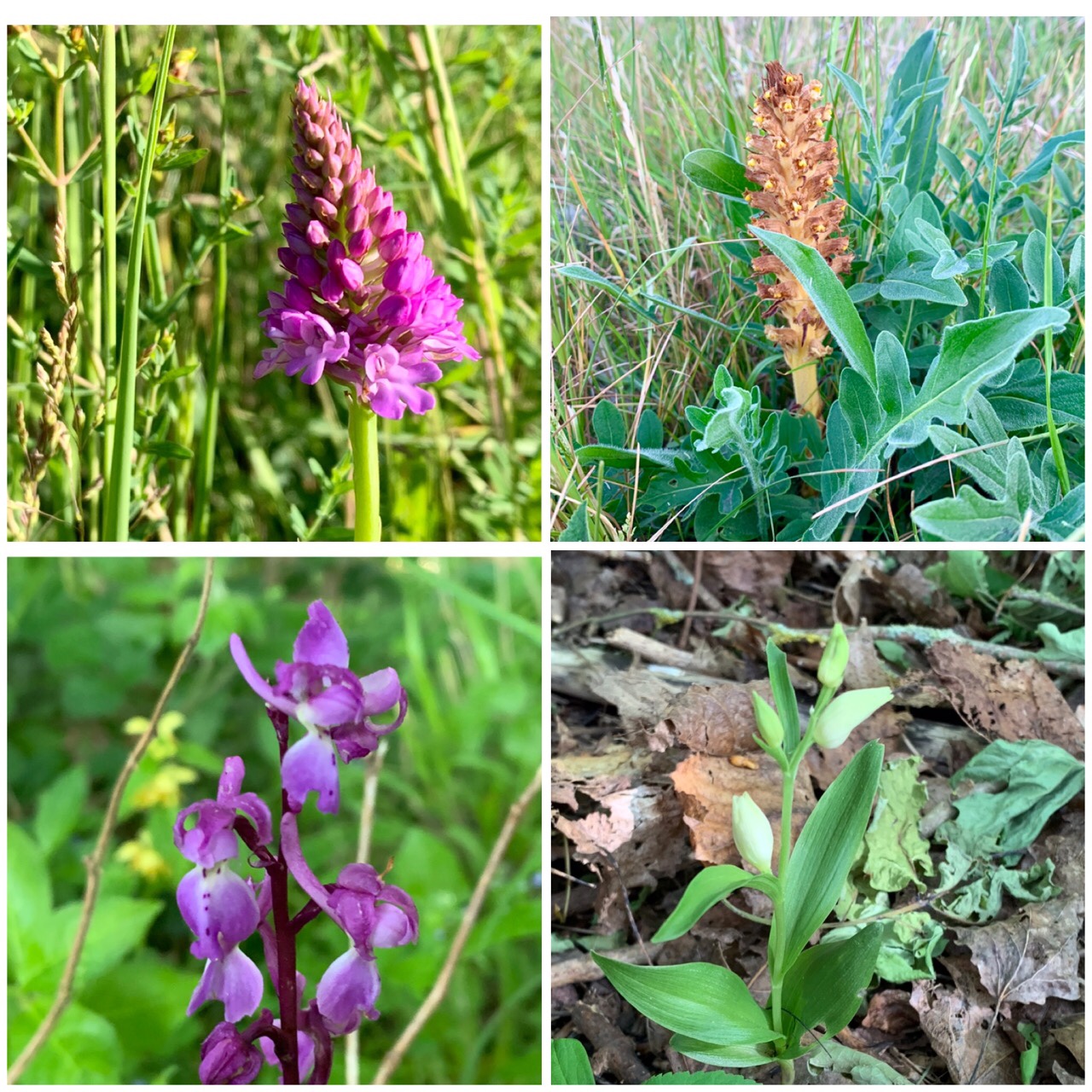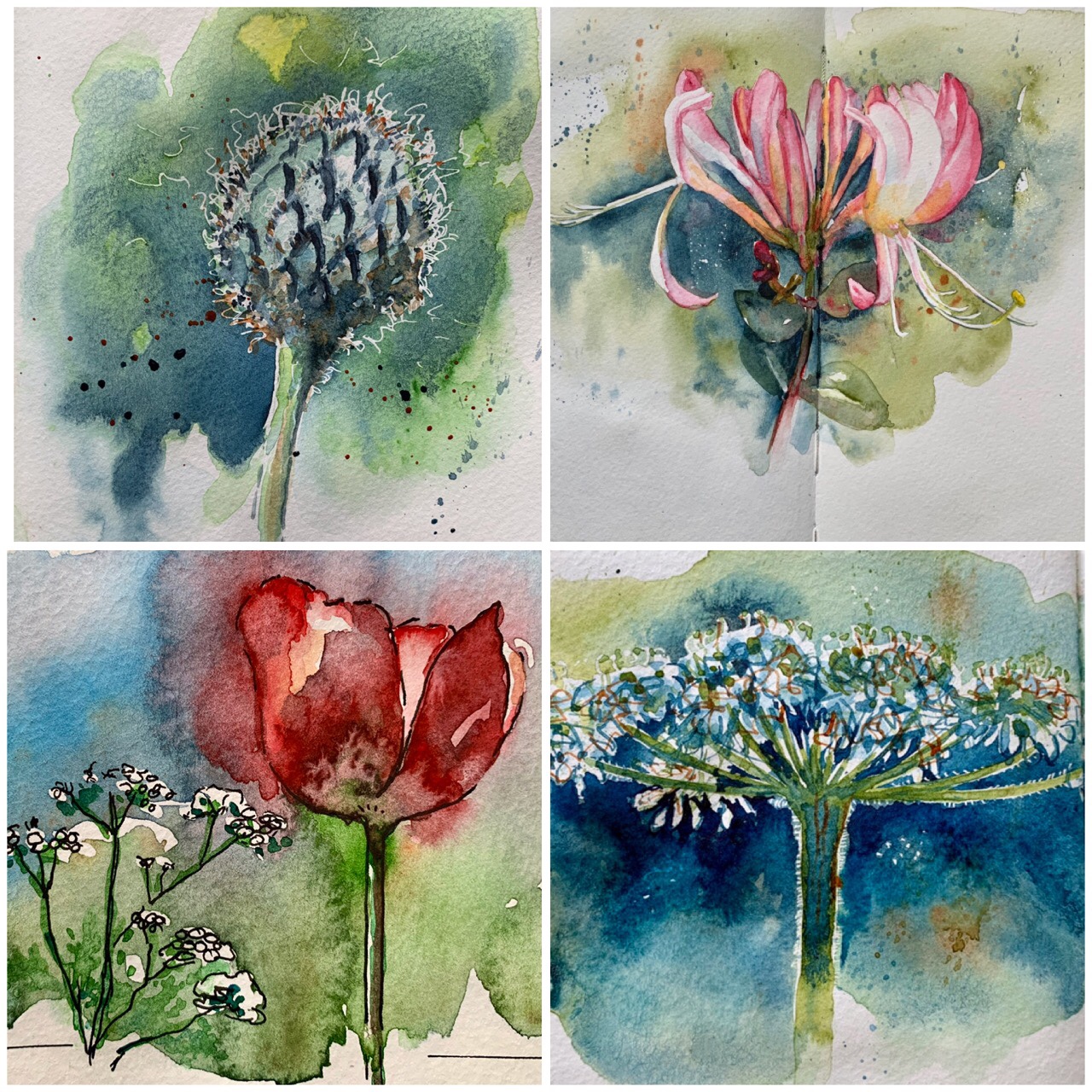“Well you don’t know, do you?”
“It’s in Leeds and Bradford now”
“They should keep those cruise ships down there. They shouldn’t let them back up here”
“You have to do that hand washing – all between t’fingers and everything”
“‘Owd folk have been told t’stay indoors. Well you can’t do that, can you?”
This conversation between two elderly people in a Skipton cafe was recorded in my sketchbook at the beginning of March, the start of one of the strangest periods of my life. Italy was in the grip of a lethal pandemic, and people were returning from Alpine skiing trips, some carrying more than their luggage. Two days later, having been told that two friends had tested positive for Coronavirus, I was heading home to avoid spreading this frightening illness. The next day I was displaying mild symptoms. By 24 March 2020 the whole of the UK was in lockdown, confined to our homes and gardens except for essential food shopping and single daily walk. Older people were ‘shielding’ and I’d already been in quarantine for two weeks.

Although the next few months were to bring suffering and tragedy to so many people it has also been a time of great peace. The skies were clear of planes for the first time since the 2010 eruptions of Eyjafjallajökull in Iceland. The nearby motorway was silent. The weather was glorious. And the dawn chorus was utterly magical. I took to rising at dawn and stepping out into this faeryland world with its red dawns and wisps of mist, walking miles before other people were awake. Often I would see no one, or maybe only a dog walker in the distance, or a farmer in the fields. There was a sense of privilege which continued as each day brought new joys. Silence and the lack of human noise and movement was encouraging wildlife to thrive. Birdsong was louder and more melodious than ever. A sighting of single roe deer was followed by herds of fallow deer, seen so close I felt I could reach out and touch them. One herd had two white hinds, often leading them in elegant flight across a field, or seen as ghostly shapes through the trees. Muntjac deer scurried away barking an eerie call. The motorway, which had felt like a physical barrier before lockdown, was no longer preventing walks on its far side and I explored further and further into the deepest and most rural of Hampshire’s chalk landscapes. Hares were out in force, some singles but often in pairs boxing in the stubble. On one incredible morning I saw upwards of thirty racing and chasing each other across a field stained pink and gold in the sunrise. On another occasion a solitary hare bounded along a path and sat at my feet as I stood statue still. Skies unsullied by contrails or pollution gave daily dawn light shows. Many places around the world reported noticing the benefits of lower pollution levels, with city dwellers seeing distant mountains and sea creatures returning to shipping ports.

One moonlit night I camped in the traffic-noise-free garden and listened to the owls hooting, waking before dawn to walk twenty miles before ‘breakfast’. At the supermarket (my first visit in four weeks, and long after the toilet roll looting) I found well organised queues in the car park with silent people waiting two metres apart, and felt thankful for the dry weather. I was now furloughed and unsure when I’d be working again.

Back at home the garden was benefitting from this enforced confinement. The vegetable plot has been resurrected and the crops are growing, protected from the rabbits that have taken over the lawn. The bird feeders are under siege from nuthatches, bluetits, exotic charms of goldfinches, greenfinches, chattering tree sparrows, chaffinches, and many more. First the foraging parents came and then their noisy, demanding fledglings. Greater spotted woodpeckers hammer the apple tree. At breakfast one day there was a commotion outside the window when a sturdy brown and cream stoat dragged a baby rabbit down the gravel path and out through the gate. The distraught mother had put up a fierce fight but rushed back into the safety of the burrow under the bushes to grieve. Later we stood guard over a young bank vole that was squatting in the lane nibbling fallen field maple blossom. As I write this I keep glancing out of the window to watch the green woodpecker foraging for juicy ants in the nests that hide in the unmown grass. A kestrel has just flown in to perch on the post by the steps, scattering the feeding hordes.


One morning I left the house as the full moon was setting to see the monochrome world slowly transform. After a crimson and gold dawn the sky was washed with the clearest ultramarine blue fading to soft cerulean at the horizon. Acid lemon rapeseed sat against a backdrop of fresh greens, whilst the sepia and burnt sienna of newly ploughed fields contrasted with the soft viridian of newly sprouting spring wheat. Despite weeks of dry warm weather our chalk streams were flowing strongly, the lush vegetation along their banks sheltering coots and moorhens. The persistent rains of winter had filled the chalk sponge so the winterbourne streams are only now, in early June, beginning to show signs of drying out for the summer.

By the start of May the slow relaxation of lockdown brought the return of traffic noise. Essential workers were delivering goods, and although I knew that the peace could not last forever, it was hard to let go of the silencing of human traffic. I drew a portrait of a friend as a memento of this time. In comparison to my tranquil life she was spending her days nursing the sick and dying in hospital, and feeling overwhelmed by the tragedy of it all. It was a stark reminder that so many are suffering, not just from the virus but from loneliness or the fear that comes from losing jobs or having no income.

Early May also saw my first visit to parents. I’d not seen them since the beginning of March, probably the longest period apart ever. I saw them again at the end of the month as we celebrated my father’s 90th birthday. By now I was surprisingly fit and strong, often walking up to twenty miles before lunch, seeing the seasons passing as the fresh leaves of spring became the rich dark greens of summer. In early June our daughter visited us for the first time since lockdown: it felt so strange to not greet her with hugs.


The seasons are passing, and with them the peace and joy and hope of that time, shattered by world events, protest marches and antisocial behaviour. My beloved Lake District, along with so many other National Parks and beauty spots, has suffered severely from littering and wild fires, often caused by disposable barbecues. The glorious weather, which made confinement so much more bearable also encouraged this behaviour. As the lid on the lockdown pressure cooker was lifted people who had been cooped up for so long in their homes boiled over into the countryside. The crush of so many people in remote places was too great, and lack of understanding or lack of thought left many of our most beautiful places damaged.

I knew this time of tranquility couldn’t last and that human noise would return but for a few weeks the world felt right. What had been lost was found. There was a sense of optimism amongst those who believe the environment and our fellow creatures matter. I am still hopeful that there will be positive changes. In the loss of freedom I gained another kind of liberty. I’ve walked as much as I would have done on a distant backpacking trip, but along local paths and trails, watching the changing seasons in familiar haunts. I’ve seen lush fragments of ancient woodland moored between the monoculture fields, carrying their precious cargos of diversity. I’ve seen small meadows filled with wildflowers still holding their own against the encroaching swathes of weedkillered cereals. The contrast between the farmed ‘deserts’ and the diverse verges and headlands has never seemed so marked. This was to have been the year that I set out on another long distance trek and yet I don’t feel I’ve missed out. Seeing the world in close up, and rediscovering my local patch has been a blessing. The greatest gift of this time has been the slowing down of life. That I will hold onto when all this is over.

“Don’t it always seem to go
That you don’t know what you’ve got ’til it’s gone?
They paved paradise
Put up a parking lot” – Joni Mitchell

Beautifully written, beautifully told and beautiful pictures.
LikeLiked by 1 person
Thank you 😊👍😊
LikeLike
Absolutely ALL OF IT! 👍
LikeLiked by 1 person
Thank you. It’s been quite a time for reflection. I’m certainly changing some of my ways of living off the back of it.
LikeLike
Strikes such a chord and has inspired me to write down my own thoughts in a blog! Very well written Lizzi; I enjoyed reading this.
LikeLiked by 1 person
Thanks Chris. I’ll have a look at yours – it’s all been so totally individual & personal.
LikeLike
Thank you. That was such a joy to read and so well crafted. You are so talented. Thank you for sharing this.
LikeLiked by 1 person
Thank you. What a delightful comment 😊
LikeLike
Beautifully written, it was an ‘unusual’ time in many ways and will be remembered for many many reasons. Absolutely love your paintings/sketches.
LikeLiked by 1 person
Thank you. It’s lovely to have positive feedback. Much appreciated.
LikeLike